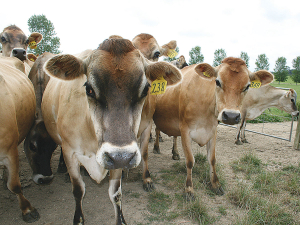DairyNZ Levy Vote Underway as Chair Highlights Seven-Fold Return
Voting has started for the renewal of DairyNZ's milksolids levy.
 DairyNZ says the 66% reduction in the levy dairy farmers pay reflects the good progress made in response to M. bovis.
DairyNZ says the 66% reduction in the levy dairy farmers pay reflects the good progress made in response to M. bovis.
A biosecurity levy, imposed on dairy farmers to fight Mycoplasma bovis, will reduce by 66% from next month.
The Biosecurity (Response – Milksolids) Levy will reduce from 2.4c/kgMS to 0.8c/kgMS from July 1.
DairyNZ chair Jim van der Poel says the 66% reduction in the levy dairy farmers pay reflects the good progress made in response to M. bovis.
“When the sector works well together, we get results,” says van der Poel.
“While we may still see a few more cases, we are now approaching the surveillance phase and costs have reduced, thanks to a combined effort.”
The M. bovis Programme is now six years into a 10-year eradication plan with currently no active, confirmed properties.
DairyNZ is a partner in the programme, with the Ministry for Primary Industries (MPI) and Beef + Lamb NZ.
DairyNZ director Chris Lewis says the decision to reduce the Biosecurity Response Levy was made with confidence.
“We’re in a good place right now and this levy reduction will be some relief to dairy farmers, ensuring they do not pay more than is required. The programme to eradicate M. bovis has been at a huge financial and emotional cost to New Zealand farmers, yet the cost of letting it spread would have been much higher.”
The M. bovis eradication programme has cost around $722 million to date. It was estimated the cost of letting it spread would have been $1.3 billion in lost productivity in the first 10 years alone.
This is an important time too to highlight that good biosecurity practices and keeping NAIT records up to date will ensure the risk of M. bovis and other livestock diseases are minimised.
The industry cost share for the M. bovis Programme is 32% of the total cost, with DairyNZ paying 94% and Beef + Lamb NZ paying 6% of the industry cost share of eradication.
Former Fonterra executive Alex Turnbull has been appointed CEO to lead all five Yili Oceania Business Division companies in New Zealand.
Fonterra executive René Dedoncker is leaving the co-operative later this year to lead Australian agribusiness Elders.
Alliance Group and the Southland Stags rugby team have joined forces in a partnership that will see the the meat co-operative's farmgate brand feature on players' team kits and replica jerseys.
Fonterra's plan to expand its organic programme to the South Island is being well received by farmers, the co-op says.
Voting has started for the renewal of DairyNZ's milksolids levy.
The most successful catchment groups in NZ are those that have 'a source to sea' approach.

OPINION: Here w go: the election date is set for November 7 and the politicians are out of the gate…
OPINION: ECan data was released a few days ago showing Canterbury farmers have made “giant strides on environmental performance”.